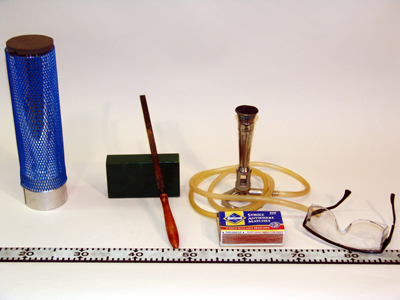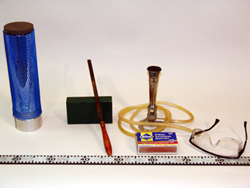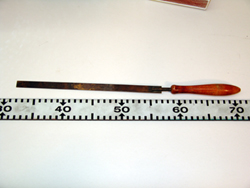|
Size: 1771
Comment:
|
Size: 2082
Comment:
|
| Deletions are marked like this. | Additions are marked like this. |
| Line 2: | Line 2: |
| = Bimetallic Strip, 4A30.10 = | ||<30% style="text-align:center">[[PiraScheme#Thermodynamics|Table of Thermodynamics Demonstration]] ||<30% style="text-align:center">[[TDEquipmentList|Thermodynamics Equipment List]] ||<30% style="text-align:center">[[Demonstrations|Lecture Demonstrations]] || = Bimetallic Strip, 4A30.10a = '''Topic and Concept:''' Thermal Properties of Matter, [[ThermalProperties#SolidExpansion|4A30. Solid Expansion]] |
| Line 9: | Line 15: |
| (attachment photo showing the fully set up demonstration) | {{attachment:4A30-10a-01a.jpg}} |
| Line 11: | Line 17: |
| '''Description:''' | '''Abstract:''' |
| Line 17: | Line 23: |
| ||Bimetallic Strip||[:ThermoCabinetBayA3: TD, A3, Shelf #1]|| || | ||Bimetallic Strip||[[ThermoCabinetBayA3| TD, A3, Shelf #1]]|| || |
| Line 23: | Line 29: |
| '''Setup:''' | '''''Important Setup Notes:''''' |
| Line 25: | Line 31: |
| 1. Install the burner. 1. Heat the bimetallic strip until it bends to one side. 1. Then, open the liquid nitrogen tank and put the bimetallic strip in the liquid nitrogen tank. 1. Take the bimetallic strip out of the liquid nitrogen tank and show students that it bends to the opposite side. |
* This demonstration requires a supply of methane gas usually provided by the [[RedWhiteGasCart|red and white gas carts]] found in rooms 2103, 2241, (and 2223 upon request). '''Setup and Procedure:''' 1. Make sure that you have all apparatuses in the table above. |
| Line 31: | Line 40: |
| 1. Beware of the burner and the liquid nitrogen. | * Beware of the burner and the liquid nitrogen. |
| Line 33: | Line 42: |
| '''Demonstration:''' | '''Discussion:''' |
| Line 35: | Line 44: |
| The bimetallic strip consists of brass and stainless steel. Since brass has higher thermal expansion coefficient than stainless steel. When it is heated by the burner, it bends to the stainless steel side. On the other hand, placed in liquid nitrogen (77K) the strip bends in opposite which is to the brass side. | The bimetallic strip consists of brass and stainless steel. Since brass has higher thermal [[http://en.wikipedia.org/wiki/Coefficient_of_thermal_expansion|expansion coefficient]] than stainless steel. When it is heated by the burner, it bends to the stainless steel side. On the other hand, placed it in liquid nitrogen (77K) the strip bends in opposite which is to the brass side. |
| Line 38: | Line 47: |
| ||attachment other photos||attachment other photos|| ||attachment other photos||attachment other photos|| |
||{{attachment:4A30-10a-01i.jpg}}||{{attachment:4A30-10a-03-250.jpg}}|| |
| Line 43: | Line 52: |
| 1. [:http://hyperphysics.phy-astr.gsu.edu/hbase/thermo/bimetal.html: Hyperphysics] | * [[http://hyperphysics.phy-astr.gsu.edu/hbase/thermo/bimetal.html|Hyperphysics - Bimetalic Strip]] |
| Line 45: | Line 54: |
| [:ThermalProperties:Thermal Properties of Matter] [:Demonstrations:Demonstrations] [:Instructional:Home] |
[[Instructional|Home]] |
Bimetallic Strip, 4A30.10a
Topic and Concept:
Thermal Properties of Matter, 4A30. Solid Expansion
Location:
Cabinet: Thermodynamics Cabinet
Bay: (A3)
Shelf: #1

Abstract:
Insert description of apparatus, its component, what it is demonstrating.
Equipment |
Location |
ID Number |
|
|
|
Bimetallic Strip |
|
|
Burner |
location |
NA |
Liquid nitrogen |
location |
NA |
Safety grove and glasses |
location |
NA |
Important Setup Notes:
This demonstration requires a supply of methane gas usually provided by the red and white gas carts found in rooms 2103, 2241, (and 2223 upon request).
Setup and Procedure:
- Make sure that you have all apparatuses in the table above.
Cautions, Warnings, or Safety Concerns:
- Beware of the burner and the liquid nitrogen.
Discussion:
The bimetallic strip consists of brass and stainless steel. Since brass has higher thermal expansion coefficient than stainless steel. When it is heated by the burner, it bends to the stainless steel side. On the other hand, placed it in liquid nitrogen (77K) the strip bends in opposite which is to the brass side.
|
|
References:

